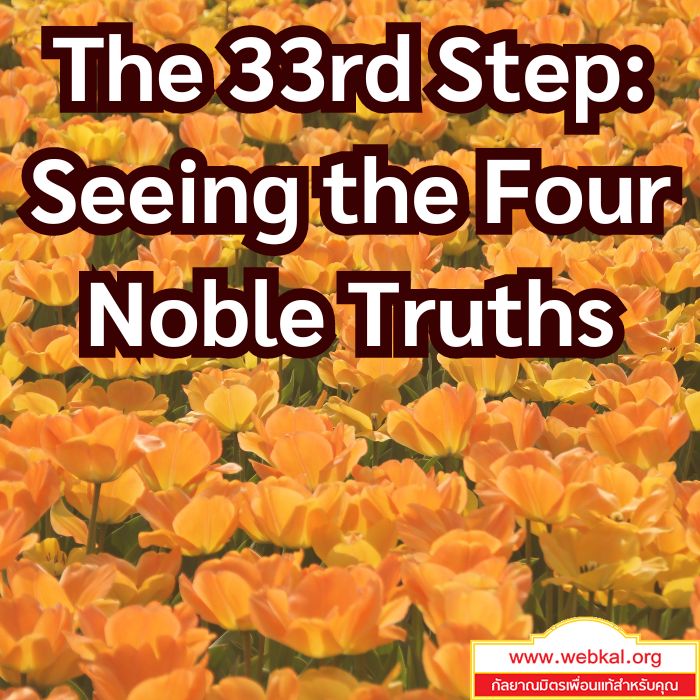
The 33rd Step: Seeing the Four Noble Truths
The Lord Buddha discovered the key to the nature of reality of human beings. It can be said that everyone in the world is ill with the disease of suffering, but it is as if no one really knows it. As a metaphor, all human beings have defects or imperfection as their norm. Thus, they do not know what a perfect person or a great man is like.
Nevertheless, for a wise man, he realizes that the older he gets the more miseries he will encounter in life. He perceives it but is unable to see it and does not know the solution to the miseries that will come.
There are two characteristics of suffering.They are:
1) Inevitable Suffering. According to the Lord Buddha, birth is suffering. It is the starting point for all the other sorts of suffering. All beings cannot escape from the nature of reality of life associated with birth, old age, illness, and death.
2) Miscellaneous Suffering. This kind of suffering is caused from the mind is lacking in quality; it is the type of suffering which we can escape. However, for people who do not make effort to escape, they can meet the following types of suffering:
2.1) Sorrow (soka): The dry-minded suffering.
2.2) Lamentation (parideva): Sorrow that drives one to tears.
2.3) Pain (dukkha): The physical suffering.
2.4) Feeling slighted (domanassa): One who is aggressively sensitive about a particular thing or bears a grudge.
2.5) Despair (upāyāssa): Giving up any hope of success in something.
as being ignorant. Although a person is abundant in knowledge and technology, if he does not educate himself in his conscience and of what is merit or demerit, he is categorized as being ignorant.
The differences in the damage caused by desire, hatred, and ignorance are as followings:
Desire - although not very damaging it requires a long time to recover from its negative effects.
Hatred - being very damaging but not taking long to recover from its negative effects.
Ignorance - being very damaging and also taking a long time to remedy.
evident or subtle. As a result, the mind becomes fresh, bright, and ready to work (thinking is the mind's duty). Such quality of the mind is the case for the mind of an Arahant.¹
The subtle defilements in the mind are consisted of desire, hatred, and ignorance.
Desire (rāga) is lust or passion. This subtle defilement deeply adheres to our mind. It is composed of sensual pleasures, namely: form, sound, scent, taste, touch, and mind/mental objects. The characteristics of desire are not very damaging or unwholesome to ordinarypeople. But for the uncontrolled mind, desire will worsen and develop to a state of gross defilements. With its effect, it drives one to commit unwholesome acts.
Hatred (dosa) is ill-will which is very damaging. Examples include thoughts of scolding, thoughts of killing, thoughts of kicking something, thoughts to set a house on fire, thoughts to make others feel ashamed, etc.
Ignorance (moha) is delusion. One's mind becomes darkened, losses conscience, and does not recognize whatis merit and demerit. Being uneducated is not the same